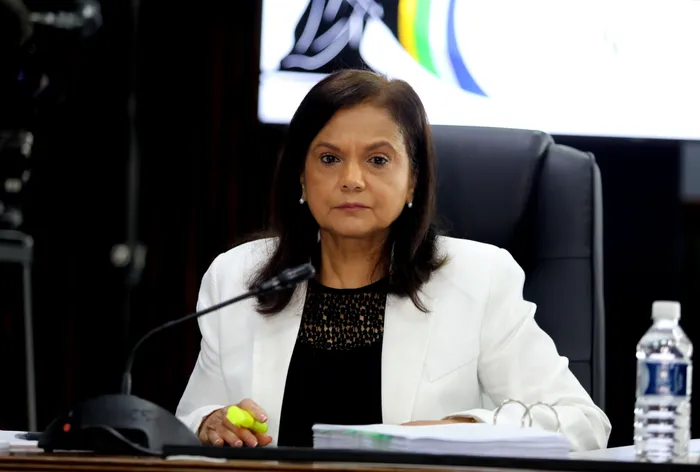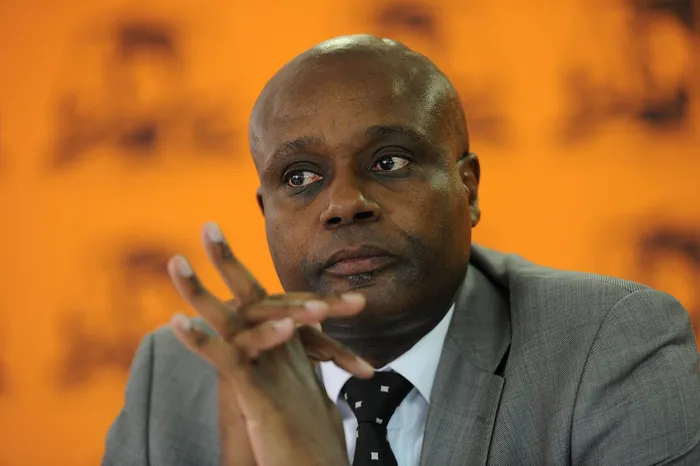
NPA boss Advocate Shamila Batohi
Image: Oupa Mokoena/Independent Newspapers
In a decisive moment at the Nkabinde inquiry, the National Director of Public Prosecutions (NDPP) Shamila Batohi has levelled serious accusations against Gauteng Director of Public Prosecutions (DPP) Andrew Chauke.
Batohi asserts that Chauke “did not act as a reasonable prosecutor” when he withdrew murder and related charges against former Crime Intelligence chief Richard Mdluli, despite a wealth of compelling evidence suggesting that the case warranted prosecution.
Batohi made her remarks while testifying before the inquiry chaired by retired Justice Elizabeth Nkabinde, with the assistance of Advocate Elizabeth Baloyi-Mere and attorney Matshego Ramagaga. Evidence was led by Advocate David Mohlomoynane SC. Her testimony followed a thorough review of affidavits, court documents, and records, and was bolstered by the message that she was constrained by time in preparing her affidavit.
The charges against Mdluli originated from allegations dating back to 1998. They included serious allegations such as murder, attempted murder, kidnapping, intimidation, and assault, linked to the killing of Tefo Oupa Ramogibe. According to Batohi, the evidence meticulously compiled by investigating officer Colonel Kobus Roelofse paints a troubling picture of “a history of threats, intimidation, and violence” associated with Mdluli’s opposition to Ramogibe’s relationship with the late Tshidi Buthelezi.
Despite the evidence leading to Mdluli's arrest in March 2011, Chauke’s office received representations from Mdluli’s lawyers later that year, alleging a conspiracy by senior police officials. However, as Batohi recounted, Chauke’s own prosecution team, led by Advocate Zaais van Zyl and Public Protector Kholeka Gcaleka, strongly supported pursuing the case, concluding that a solid circumstantial case existed against Mdluli.

NDPP Shamila Batohi told the Nkabinde Inquiry that documents show Advocate Andrew Chauke was not a mere coordinator in the Cato Manor case, but deeply involved in evidence analysis and core prosecutorial decisions.
Image: Supplied
Batohi expressed disbelief when Chauke decided to withdraw the charges in February 2012, instead referring the matter to an inquest. “One would have expected that, in the face of such serious allegations and given his own prosecutors’ advice, the DPP would proceed with the case,” said Batohi, “Instead, he withdrew it.”
The matter sparked a legal battle when Freedom Under Law (FUL) challenged the withdrawal in court. This led to a detailed judgment delivered by Judge John Murphy in September 2013, which Batohi argued highlighted that the inquest magistrate had accepted core evidence implicating Mdluli while reaching “incoherent and contradictory” conclusions. As Batohi conveyed to the panel, Judge Murphy established that there was indeed a prima facie case against Mdluli, contradicting the magistrate’s final claim of “no evidence” linking him to the killing.
“Murphy held that Chauke simply ignored incriminating evidence,” Batohi noted, emphasising that rather than engaging with the evidence, Chauke claimed a lack of incriminating material. She read key portions of the judge's order into the record, directing that charges be reinstated “forthwith” and prosecuted with diligence. The SAPS was also mandated to reinstate disciplinary actions against Mdluli and his associates.
Despite the clear ruling from the court, Batohi lamented that Chauke and the National Prosecuting Authority (NPA) opted to appeal Murphy’s judgment. When asked who made the decision to appeal, Batohi stated she was unsure but presumed Chauke would have recommended it to the NDPP at the time. She found this decision puzzling, given the unequivocal nature of Murphy’s findings.
Throughout her compelling testimony, Batohi reiterated that the evidence available at the time not only supported prosecution but also illustrated a significant inconsistency in Chauke's actions against established prosecutorial policies. “The record shows that he ignored the recommendations of his own prosecutors,” she noted, revealing a stark contrast between the weight of the evidence and Chauke's seemingly negligent response.